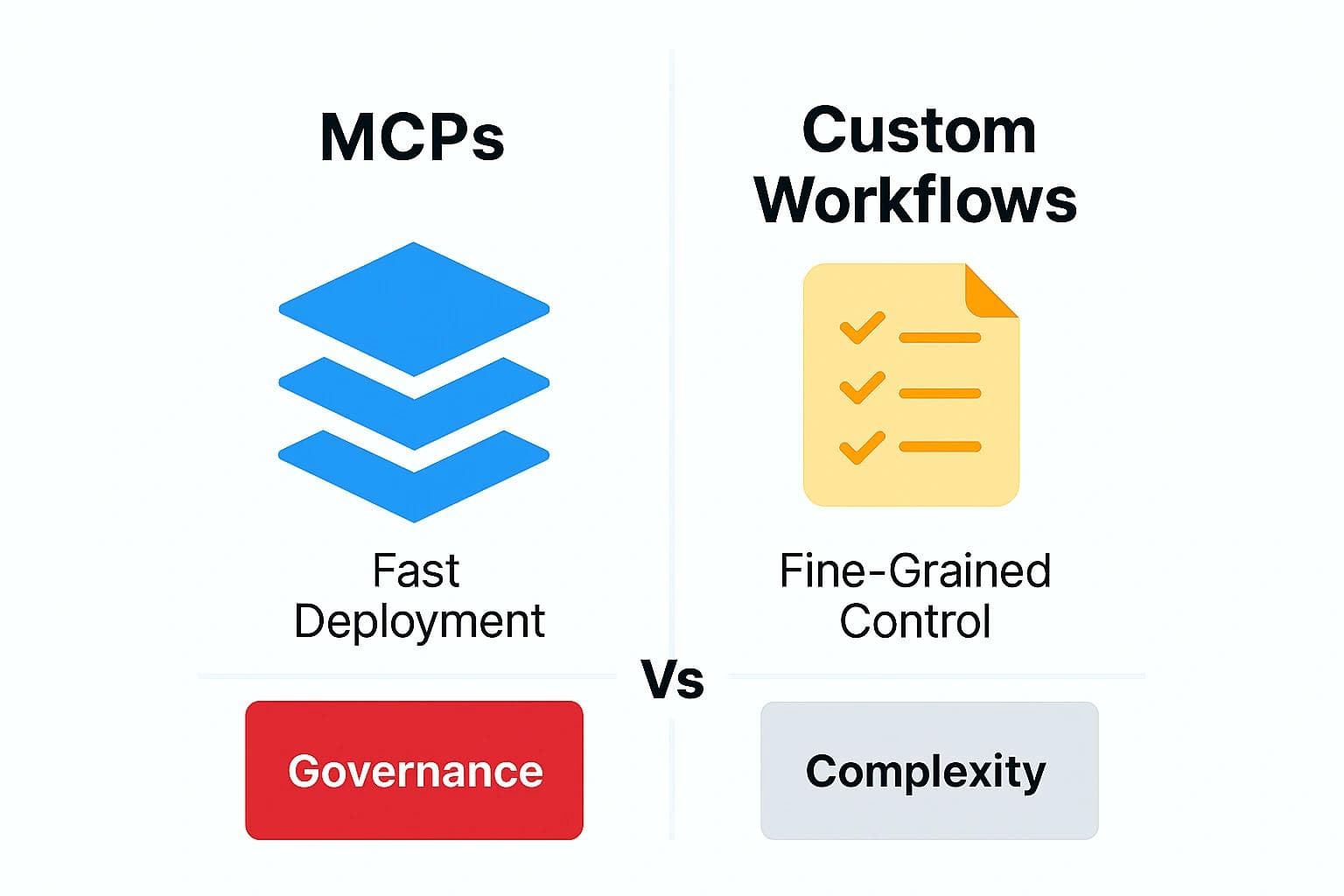Enterprise Automations: MCP Tools or Custom Pipelines?
Oct 29, 2025 | 4 min read

Choosing the right automation strategy can make or break your enterprise AI initiatives. As organizations push toward smarter workflows and faster decision-making, the question of how to integrate AI systems becomes critical. Should you go with Managed Cloud Protocol (MCP) tools that promise quick setup and standardization, or build custom pipelines that give you complete control?
Let's break down what each approach offers, where they fall short, and how to make the right choice for your organization.
Understanding Your Options
Before diving into comparisons, it helps to understand what these approaches actually mean.
MCP Tools are standardized frameworks that connect Large Language Models (LLMs) and AI agents to various enterprise systems. Think of them as universal adapters that let different AI platforms talk to your databases, APIs, and applications without custom coding for each connection.
Custom Pipelines, on the other hand, are built from the ground up by your development teams. They're tailored workflows designed to handle your specific business logic, data flows, and security requirements. Every integration point is coded and maintained by your internal teams.
So which one fits your needs?
When MCP Tools Make Sense
If your organization values speed and standardization, MCP tools might be your best bet. Here's why many enterprises lean toward this approach:
Quick Time to Value
MCP frameworks come with pre-built connectors and authentication mechanisms. Your teams can have AI workflows running in days instead of months. For businesses looking to experiment quickly or scale fast, this advantage is hard to ignore.
Built-In Scalability
As your automation needs grow, MCP platforms are designed to expand without major architectural changes. Adding new data sources, integrating additional AI models, or onboarding more users becomes straightforward.
Centralized Monitoring
Most MCP solutions provide dashboards where you can track all AI interactions, audit actions, and enforce policies from one place. This visibility is valuable for compliance and governance teams.
But Watch Out For:
- Immature ecosystem: MCP is still evolving. You might encounter compatibility issues or gaps in features you need.
- Security concerns: Default configurations often lack fine-grained permissions. Without proper setup, you risk exposing sensitive data or granting excessive access to AI agents.
- Limited customization: If your business has unique workflows or legacy systems, MCP might not bend enough to accommodate them.
When Custom Pipelines Win
For enterprises with complex requirements, strict compliance needs, or unique workflows, custom pipelines offer advantages that standardized tools can't match.
Complete Control Over Security
You decide exactly how data flows, who has access, and what approvals are required. For industries like healthcare, finance, or government, this level of control isn't optional.
Tailored Performance
Custom pipelines let you optimize for specific metrics that matter to your business. Need ultra-low latency? Want to keep all data on-premises? Custom builds make these requirements achievable.
Integration with Legacy Systems
Many enterprises run on decades-old infrastructure. Custom pipelines can bridge the gap between modern AI tools and legacy databases or applications in ways that standardized protocols struggle with.
Event-Driven Workflows
You can build sophisticated approval chains, human-in-the-loop checks, and conditional logic that matches your exact business processes.
But Be Aware:
- Higher complexity: Every custom integration increases maintenance burden. Documentation gaps and technical debt accumulate quickly.
- Slower deployment: Building from scratch takes time. Expect weeks or months before new AI capabilities go live.
- Resource intensive: You need skilled developers to build, maintain, and update these systems continuously.
Security and Governance: The Deal Breakers
Regardless of which path you choose, security and governance cannot be afterthoughts. AI systems handle sensitive information and make decisions with real business impact.
Critical considerations include:
- Implementing comprehensive audit trails for all automated actions
- Enforcing least-privilege access and regularly reviewing permissions
- Building human approval workflows for high-risk operations
- Maintaining version control for prompts, tools, and configurations
- Monitoring for unauthorized integrations or shadow AI deployments
Both MCP and custom approaches can meet these requirements, but neither does so automatically. You must design governance into your architecture from day one.
Making Your Decision
So, what should you pick?
Choose MCP tools if:
- You need to deploy AI capabilities quickly
- Your organization wants to minimize custom code and maintenance
- Standardization and interoperability matter more than deep customization
- You have cloud-native infrastructure and modern applications
Choose custom pipelines if:
- You operate in highly regulated industries with strict compliance requirements
- Your workflows are unique and don't fit standard patterns
- You need to integrate deeply with legacy systems
- Complete control over security and data flow is non-negotiable
Consider a hybrid approach if:
- You want the speed of MCP for standard workflows but need custom solutions for sensitive operations
- Different departments have varying requirements
- You're transitioning from legacy systems gradually
Final Thoughts
There's no universal answer to MCP versus custom pipelines. The right choice depends on your security requirements, technical capabilities, timeline, and long-term vision. What matters most is that you prioritize governance, build with security in mind, and stay flexible enough to adapt as AI technology evolves.
The enterprises that succeed with AI automation aren't necessarily those with the fanciest tools. They're the ones that align technology choices with business reality and never compromise on security or compliance.